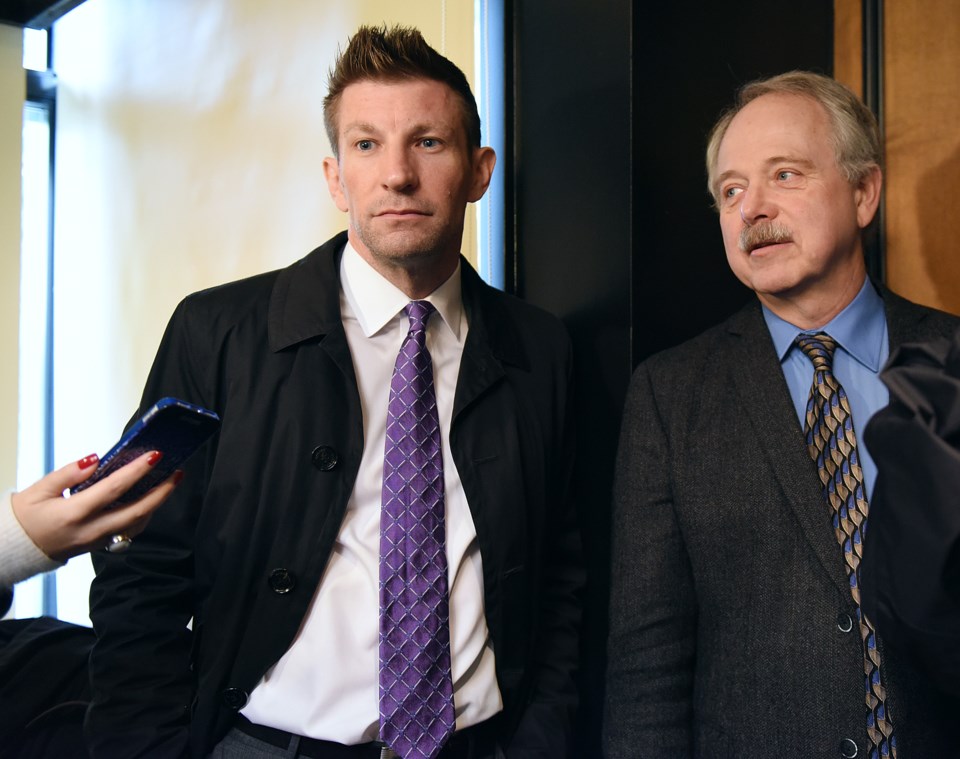Now that all those millions of dollars have been spent by Vision Vancouver and the NPA on another ludicrously expensive campaign, the NPA has more to say about what reforms should be in place for the 2018 election.
Last Saturday, NPA treasurer Jason King presented the party’s position on campaign finance reform to a committee of MLAs tasked with collecting information from parties and the public about what changes they want.
I happen to have a copy of the NPA’s submission.
Right off the top, I can tell you the party didn’t make any specific demands to have a ban on corporate and union donations, which have made up the bulk of donations to the NPA and Vision Vancouver.
Vision has called for this, so have the Greens and COPE. I believe the NPA was also on side with the ban way back in 2010 when a tri-party council committee sent recommendations to the provincial government.
But here’s what King told the committee Saturday:
“During the course of the recent municipal election, there was some degree of controversy and discussion around the real or perceived propriety of large donations from single sources. We, therefore, feel there is a need to review the rules around union and corporate donations, particularly for entities that conduct business with the city. We also feel that any elimination of union and corporate donations should coincide with tax receipt status for elector organizations equivalent to that for provincial or federal government levels.”
King went on to say the provincial committee should determine overall donation limits but suggested there should be a separate category for mayoral candidates, and a separate one for other candidates vying for spots on council, school board and park board.
“We support a model that provides a base expense limit and adds an additional amount per elector [base rate plus additional amount per elector] when the population exceeds a base population as established by legislation,” he wrote.
Hmmm…still sounds like a lot of cash could be spent.
As I learned in researching a story in 2006, Toronto’s spending limits still allowed that city’s mayor at the time, David Miller, to spend up to $1.1 million in his 2003 campaign.
Council candidates in Toronto had much lower spending limits, with school board candidates eligible to spend more than their city hall counterparts, according to a formula devised by that city. Of course, Toronto has a ward system while Vancouver has an at-large voting system, which makes determining spending limits a little more tricky.
The NPA also wants periodic reporting of its finances in between elections.
But a real biggie for the NPA is a change in the agency that runs an election.
The party recommends Elections B.C., which oversaw campaign finance and advertising rules this election, to control more facets of a civic election. As we saw in Vancouver, the chief election officer was city clerk Janice Mackenzie.
“Most municipalities have neither the staff nor the experience to oversee the reporting and compliance of rules pertaining to civic electoral finance, and asking them to do so risks creating real or perceived conflicts,” King wrote. “We have significant concerns about the ability for any election in the province to be conducted with both full impartiality and the appearance of impartiality when the administrators conducting elections report directly or indirectly to elected officials.”
For the record, Vision Coun. Andrea Reimer, on behalf of her party, addressed the provincial committee Nov. 7 and asked for a ban on corporate and union donations, a limit on contributions from any one source, campaign spending limits for candidates and parties, and rules that require disclosure outside of an election period.
Now it’s up to the provincial government to make changes.
Will four years be enough time?
We’ll find out in 2018, maybe sooner.
Note: Jason King sent me a note on Twitter Friday, saying the committee asked him if the NPA supported a ban on union and corporate donations. He said he told the committee the NPA supports a ban — a significant request that was not included in the party's written submission. To further confuse city hall watchers, Robert Macdonald told me in the summer — when he was still vice-president of the NPA — that he was opposed to a ban but favoured some form of restraint on contributions and spending. In July 2013, I wrote about NPA councillors George Affleck and Elizabeth Ball voting against Vision Coun. Andrea Reimer's motion to get the big money out of politics, which included a call for a ban on union and corporate donations. Affleck told me such a ban would only lead to a rise in American-style so-called "super PACs", or political action committees. During the election campaign, I asked NPA president Peter Armstrong to clarify his party's position on electoral reform. He replied that it was "a very complex issue" and deferred to the provincial government to make the final decision on what rules should be in place for the 2018 election. "Whatever the senior government decides is appropriate, it'll be fine with us — we'll live with the rules," he said. In an interview with the NPA's mayoral candidate Kirk LaPointe during the campaign, he said he favoured a cap but wanted the province "to set the pace on this one." So, as I understand it today, the party's position is that it supports a ban on union and corporate donations. Are we all clear now?
twitter.com/Howellings



